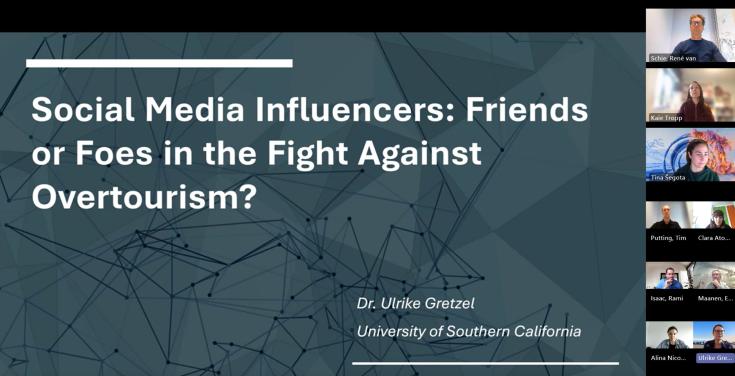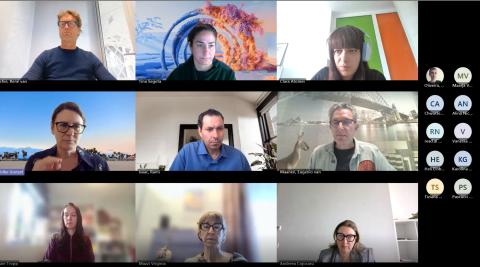Social Media & Overtourism: Insights by Prof. Ulrike Gretzel
Webinar Recap: Social Media Influencers – Friends or Foes in the Fight Against Overtourism?
Prof. Gretzel, currently Senior Research Fellow at USC Annenberg Center for Public Relations and Director of Research at Netnografica, drew from her extensive international academic and professional experience to explore how social media influencers shape contemporary tourism behaviour, and how destinations can manage their impact.
The influencer effect: personal branding meets overtourism
During the session, Prof. Gretzel highlighted that travel today has become deeply intertwined with personal branding. Tourists often view destinations as stages for carefully curated images that showcase their lifestyle, status, and identity. With social media platforms promoting aspirational imagery, destinations are increasingly chosen not for the experience itself, but for their visual appeal in photographs and posts.
This phenomenon often fuels overtourism, as visitors crowd into popular locations to replicate influencer-generated content. Prof. Gretzel illustrated how tourists now seek out not just places, but specific "props and scenes" to build their online identity, leading to congested spaces, long photo-taking sessions, and in some cases, dangerous behaviour.
Real-world challenges: from Slovenia to Croatia
In a vivid example, Tina Šegota shared how Slovenia and Croatia have experienced a sharp rise in mountain rescue operations due to unprepared tourists seeking Instagram-worthy hikes. Many visitors venture into challenging terrains without proper equipment or awareness of the risks, simply driven by the desire to capture a perfect image.
In Croatia, for instance, the mountain rescue service even launched creative public awareness campaigns, humorously reminding visitors: “If you wanted to fly, you should have bought a plane ticket, not called us.” Despite these efforts, the challenge remains how to effectively communicate with tourists who primarily consume content through their phones and social media feeds.
Collaboration is key: influencers as partners
Prof. Gretzel emphasized that influencers are neither inherently friends nor foes. The key lies in how destinations engage with them. Traditional short-term influencer marketing campaigns often fail to deliver sustainable outcomes because they lack genuine collaboration and mutual understanding between destinations and content creators.
Instead, destinations should approach influencers as long-term stakeholders. Building partnerships based on transparent dialogue allows both sides to align goals: influencers can help direct visitor flows, promote alternative experiences, and support sustainable practices — provided they understand the destination's needs and challenges.
Looking ahead: adapting to a new reality
Prof. Gretzel closed by encouraging destinations to go beyond simply banning or restricting influencer activity. Instead, they should design attractive alternative experiences that offer the same aspirational appeal while protecting sensitive areas. Moreover, destinations must continue developing expertise in managing digital platforms and working closely with content creators to balance marketing benefits with responsible tourism management.
This webinar provided highly valuable insights that will inform the Tourism in Balance partners as they continue developing innovative, forward-looking solutions for sustainable tourism across Europe.
We sincerely thank Prof. Gretzel for sharing her expertise and sparking this thought-provoking discussion!


